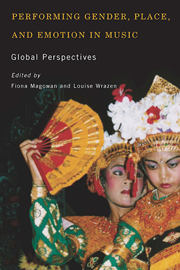Book contents
- Frontmatter
- Contents
- Acknowledgments
- Introduction: MusicalIntersections, Embodiments, and Emplacements
- Part One Landscope and Emotion
- Part Two Memory and Attachment
- Part Three Nationalism and Indigeneity
- 7 Singingthe Contentions of Place: Korean Singers of the Heart and Soul of Japan
- 8 “In Our Foremothers' Arms”: Goddesses, Feminism, and the Politics of Emotionin Sámi Song
- Afterword
- Selected Bibliography
- List of Contributors
- Index
8 - “In Our Foremothers' Arms”: Goddesses, Feminism, and the Politics of Emotion in Sámi Song
from Part Three - Nationalism and Indigeneity
Published online by Cambridge University Press: 05 December 2013
- Frontmatter
- Contents
- Acknowledgments
- Introduction: MusicalIntersections, Embodiments, and Emplacements
- Part One Landscope and Emotion
- Part Two Memory and Attachment
- Part Three Nationalism and Indigeneity
- 7 Singingthe Contentions of Place: Korean Singers of the Heart and Soul of Japan
- 8 “In Our Foremothers' Arms”: Goddesses, Feminism, and the Politics of Emotionin Sámi Song
- Afterword
- Selected Bibliography
- List of Contributors
- Index
Summary
This chapter discusses how Sámi vocal genres can be interpreted in relation to traditional cosmologies, in particular to the goddesses. The Sámi are recognized as an indigenous people living in four countries (Norway, Sweden, Finland, and Russia). Such recognition is a result of the indigenous movement of the 1960s onward in which the revival of joik (a traditional Sámi vocal genre) was crucial in fostering a pan-Sámi indigenous sensibility. Although joik continues to play a defining role in representing a pan-Sámi political identity, it is not widespread across the region now known as Sápmi, the land of the Sámi (map 8.1). Among the Skolt Sámi in the eastern regions of Sápmi, the traditional vocal genre is the leu'dd—often a narrative about an individual, which can be understood as a form of oral history. Leu'dd is regarded as a disappearing vocal tradition, in contrast to joik, which continues to be preserved, transformed, and recreated for modern contexts.
Skolt Sámi have been forcibly relocated because of wars, Cold War military policy, and hydroelectric projects. Male singers have been killed by reindeer poachers, by alcohol abuse, or on military frontlines. The most recent recording project, undertaken in the mid-1990s, focuses, therefore, on female singers, for whom the life histories narrated in leu'dd often involve expressing distressing and overwhelming emotions. In discussing both joik and leu'dd to explore gender, place, and constructions of pan-Sáminess, this chapter focuses on female singers, Sámi cosmologies, and Sámi feminist theorization.
- Type
- Chapter
- Information
- Performing Gender, Place, and Emotion in MusicGlobal Perspectives, pp. 162 - 184Publisher: Boydell & BrewerPrint publication year: 2013

